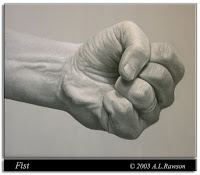 "It takes a thousand days to make a fist, a thousand days to learn a stance and a thousand days to learn to strike". Its possible this saying isn't shared by many martial artists, nevertheless its important to understand what is meant by this saying. You don't hear this shared in many schools because it can be disheartening to the western mindset of " I need everything yesterday". If you listen closely and are fortunate enough to be in a school where this philosophy prevails you will hear it in every class, in one form or another. I have to admit that if someone told me at the beginning of my training that it would take over three years just to learn how to make a fist, I may have seriously reconsidered the whole endeavor. It is the kind of lesson that is self affirming. By that I mean you understand it to be true after you have realized that it took you a thousand days to learn how to make a fist.
"It takes a thousand days to make a fist, a thousand days to learn a stance and a thousand days to learn to strike". Its possible this saying isn't shared by many martial artists, nevertheless its important to understand what is meant by this saying. You don't hear this shared in many schools because it can be disheartening to the western mindset of " I need everything yesterday". If you listen closely and are fortunate enough to be in a school where this philosophy prevails you will hear it in every class, in one form or another. I have to admit that if someone told me at the beginning of my training that it would take over three years just to learn how to make a fist, I may have seriously reconsidered the whole endeavor. It is the kind of lesson that is self affirming. By that I mean you understand it to be true after you have realized that it took you a thousand days to learn how to make a fist.In our school there is a mantra that is shared by one of our instructors. "Progress not perfection", which is usually followed by "gradually and eventually". Both are related to each other but they are not the same. What they convey is the attitude needed to excel at something like the martial arts. You do not develop proficiency in what we do overnight, it takes years and years. Years of progress not perfection, moments (long stretches) of frustration followed by brief flashes of insight and ability. One example that comes to mind: A student was working on an evasion for the better part of a year, in essence learning to move the head out of the way of an incoming fist.
Time and again that student kept getting hit, but one moment (and I was able to witness this), a fist came and the student moved effortlessly out of the way, no thought- just pure reflex. It was graceful, efficient, and quite amazing to see. That is progress. The fact that the student continued to get hit in the head afterwards does not negate the fact that the evasion occurred. Progress not perfection.
This is not to say we should not strive for perfection, of course we should. Its a worthwhile goal. It has to be done prudently though, with the knowledge that perfection is difficult(many would say impossible) to attain. In my decades of practice I have yet to do a perfect kata, it doesn't stop me from striving to do so each and every time I practice.
Progress reveals to us that perfection is ever elusive, once you think you have gotten closer to perfection, the bar is raised yet again, the target shifts to a level that is even more difficult, one you didn't even know existed before that moment. That is how progress works and that is why we never quit. If we do quit and settle, then we admit to ourselves that we no longer are seeking perfection, we have grown complacent. In our school we have a character that reads constant polishing. Each day no matter how brightly we have shined in the past we must continue to polish, remember it takes a thousand days just to begin.
strong spirit-strong mind-strong body
Sensei Orlando




